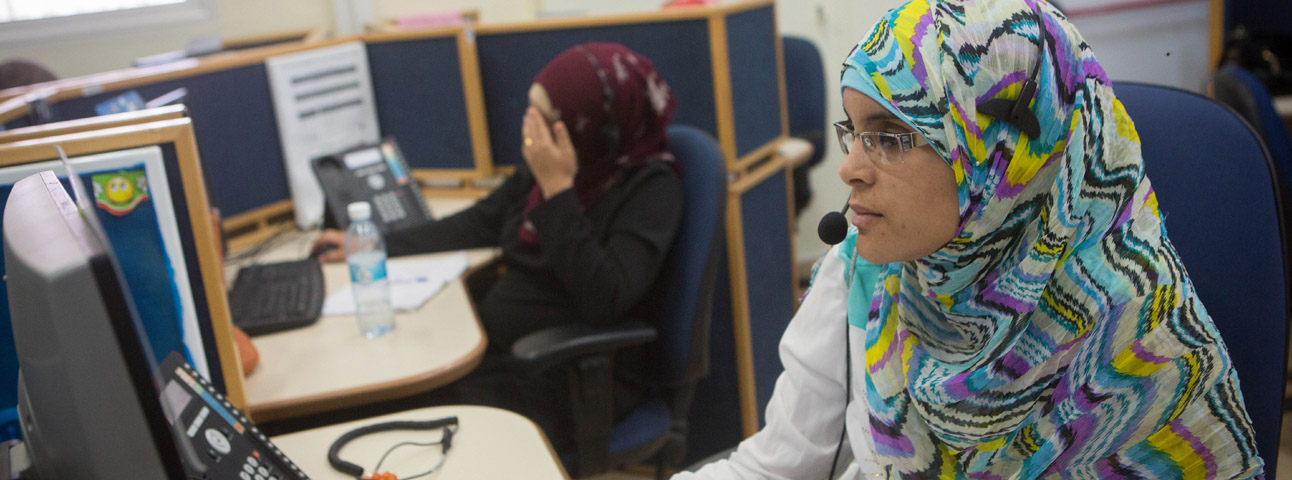How to Boost Employment of Arab Women? Invest in Educating Arab Men
Arab women are closing the gap in education – but this achievement is not reflected in the job market. What can be done?

Flash 90
The last two decades have seen a rapid and welcome increase in the numbers of Arab women with an academic education. According to Central Bureau of Statistics data, in the 2019/20 academic year, twice as many Arab women as Arab men were enrolled in colleges and universities. However, these numbers are not reflected in the job market. For a number of years, the Government has been working towards increasing the number of Arab women who join the workforce, but without great success, including among. Arab women with university or college degrees. The lack of success can be attributed to a number of factors, including a severe shortage of daycare centers for toddlers, the dearth of jobs in or near Arab localities, and language barriers. Another factor- much less discussed- is the patriarchal nature of Arab society. Many Arab men feel uncomfortable about the gap in their level of education and that of to their wives, and as a result-- make it difficult for the women to exercise their right to find a good job that may require modifying household priorities even if the wife holds academic degrees and has a high earning potential.
The situation has exacerbated over the past year, due to the COVID-19 pandemic, with its severely adverse impact on the economy and on employment, on all of Israeli society, but which is all the more devastating----- on the Arab sector. And so, as part of the recovery process and emergence from the economic downturn, the State must concentrate not only on getting Arab women into the workforce, as it has already been doing, but also on doing the same for Arab men, who will have to find their way back into the working world.
This is not only a challenge; it is also a one-time opportunity that must not be missed: not only to ensure that the percentage of Arab men who are employed returns to its 2019 level of 76% (and fell to 64% in July 2020), but also to invest in a long-term plan, , starting already in elementary school and on up, to encourage Arab men to seek higher education.
Let me explain. According to the Statistical Abstract of Israel, in the 2018/19 school year the dropout rate of Arab girls in grades 7–12 was 1.9 %, as compared with 4.5% for Arab boys—that is, more than 2½ times as high. These are the official government figures and refer only to known and recorded dropouts. But a series of recent studies found that the latent and unrecorded dropout rate has reached 40%.The assumption is that the pandemic will multiply this distressing situation two or three times over.
The more that the State and Arab local authorities invest in Arab boys so as to reduce their school dropout rate and help raise their matriculation exam scores, while placing them in educational tracks and programs that provide them with the tools they will need in the future, the more Arab men will find their way to the campuses and, as a result, find better-paying and more desirable jobs. This will not only raise the chances of Arab men returning to the workforce at the pre-pandemic rate, but will also upgrade the quality of their jobs.
Needless to say, this must not come at the expense of Arab women, but only as part of a comprehensive program that not only ensures that the numbers achieving higher education continue to rise, , but also that they will also find suitable employment. This combined effort will help not only Arab men but also Arab women, since men who are better-educated will feel less threatened by their wives’ education and will not stand in the way of their working at jobs commensurate with their education.
I'll end on a personal note. The fact that I was able to devote years and years to studying for a PhD. Degree, and find employment that is in line with my abilities and qualifications and –a job which requires me to spend long hours on the road, commuting from Taybeh to Tel Aviv or Jerusalem, can be credited in large part to the fact that my husband also attended university. He does not feel threatened by the fact that his wife spent her best years at universities and research institutes. On the contrary, he has always encouraged and supported me. Many other Arab women could also realize their potential, if Arab municipal leadership was wise enough to rearrange their priorities and put education at the top of the list for investing resources in the coming years, backed by a change in political priorities. I hope with all my heart that my daughters will be blessed with partners who enable them to flourish professionally and pursue a challenging and satisfying career, and that this will not just depend on luck in choosing a partner as it was for me, but rather on a change in policy which will be revealed and substantiated in the statistics.
The article was published in the Times of Israel.
